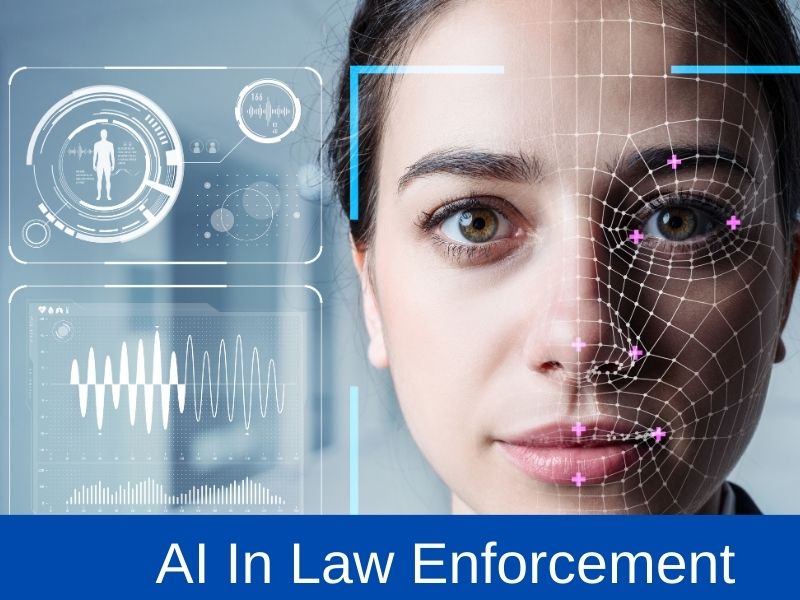
Artificial Intelligence (AI) is transforming every aspect of our lives, from how we work to how we communicate.
It is no surprise that AI technology is also revolutionizing modern law enforcement.
In this article, we will explore the basics of AI technology, its current applications in policing, and the benefits and potential drawbacks of using AI in law enforcement.
We will examine how AI can improve efficiency and accuracy in police investigations, prevent crimes before they occur, and discuss potential risks such as privacy concerns, biases, and the need for transparency and regulations.
Understanding Artificial Intelligence
What is AI?
Artificial Intelligence refers to a branch of computer science that aims to create machines or systems that can perform tasks typically requiring human intelligence.
These tasks include learning, problem-solving, pattern recognition, understanding natural language, and visual perception.
How Does AI Work?
There are several approaches to creating AI systems, but one common method is machine learning.
Machine learning involves feeding a large amount of data into an algorithm, which then “learns” from the data by identifying patterns and making predictions based on those patterns.
The more data the algorithm processes, the more accurate its predictions become.
AI in Law Enforcement Today
AI technology is already being used in various ways to support law enforcement efforts. Some of these applications include:
Predictive Policing
Predictive policing uses AI algorithms to analyze historical crime data and identify patterns that can help predict where and when crimes are likely to occur.
This allows law enforcement agencies to allocate resources more effectively and potentially prevent crimes before they happen.
Facial Recognition
Facial recognition technology uses AI algorithms to analyze images and identify individuals based on their facial features.
Law enforcement agencies can use this technology to quickly identify suspects or find missing persons.
Social Media Analysis
AI-powered tools can help law enforcement officials monitor social media platforms for potential threats or criminal activity.
By analyzing large amounts of data from social media posts, AI systems can identify patterns and trends that may indicate illegal activities or potential threats to public safety.
Benefits of AI in Policing
There are several advantages to using AI technology in policing, including:
Improved Efficiency and Accuracy
AI can process vast amounts of data much faster than humans, allowing law enforcement officers to analyze information more quickly and accurately. This can lead to more efficient investigations and better decision-making.
Crime Prevention
As mentioned earlier, predictive policing algorithms can help identify areas where crime is likely to occur, allowing law enforcement to intervene before crimes happen. This proactive approach can lead to a reduction in crime rates and increased public safety.
Resource Allocation
AI technology can help law enforcement agencies allocate resources more effectively by identifying high-risk areas and prioritizing them for patrols or other interventions. This can result in cost savings and more efficient use of limited resources.
Potential Drawbacks and Concerns
While there are many benefits to using AI in law enforcement, there are also potential drawbacks and concerns, such as:
Privacy Concerns
The use of AI technology, particularly facial recognition and social media analysis, raises concerns about privacy and the potential for mass surveillance.
There is a need for clear guidelines and regulations to ensure that AI tools are used responsibly and do not infringe on citizens’ privacy rights.
Potential Biases
AI algorithms can inadvertently perpetuate biases if they are trained on biased data.
For example, if an AI system is trained on crime data that disproportionately targets a specific racial or ethnic group, the system may be more likely to identify members of that group as potential criminals.
It is crucial to ensure that AI systems are trained on unbiased data and regularly audited for potential biases.
Transparency and Accountability
There is a need for greater transparency and accountability in the use of AI technology in law enforcement.
This includes disclosing how AI algorithms work, what data they are trained on, and how they are being used in policing efforts.
Without this transparency, it is challenging to assess the effectiveness and fairness of AI tools in law enforcement.
Conclusion and Actionable Insights
Artificial Intelligence has the potential to revolutionize modern law enforcement, improving efficiency, accuracy, and even preventing crimes before they occur.
However, there are also potential risks and concerns related to privacy, biases, and the need for transparency and regulations. To ensure that AI technology is used responsibly and effectively in law enforcement, it is crucial to:
- Develop clear guidelines and regulations for the use of AI in policing, with a focus on protecting citizens’ privacy rights.
- Ensure that AI systems are trained on unbiased data and regularly audited for potential biases.
- Foster greater transparency and accountability in the use of AI technology in law enforcement by disclosing how AI algorithms work, what data they are trained on, and how they are being used in policing efforts.
By addressing these concerns and embracing the potential of AI technology, law enforcement agencies can harness the power of AI to create safer communities and more efficient policing practices.
FAQ
What is predictive policing?
Predictive policing refers to the use of AI algorithms and data analysis techniques to identify patterns in historical crime data, which can help law enforcement agencies predict where and when crimes are likely to occur. This allows them to allocate resources more effectively and potentially prevent crimes before they happen.
How does facial recognition technology work in law enforcement?
Facial recognition technology uses AI algorithms to analyze images and identify individuals based on their facial features. Law enforcement agencies can use this technology to quickly identify suspects, find missing persons, or verify identities at checkpoints or public events.
Are there privacy concerns related to the use of AI in law enforcement?
Yes, there are privacy concerns related to the use of AI in law enforcement, particularly when it comes to facial recognition and social media analysis. There is a need for clear guidelines and regulations to ensure that AI tools are used responsibly and do not infringe on citizens’ privacy rights.
Can AI perpetuate biases in policing?
AI algorithms can inadvertently perpetuate biases if they are trained on biased data. It is essential to ensure that AI systems are trained on unbiased data and regularly audited for potential biases to avoid unfairly targeting specific groups or individuals.
How can AI improve resource allocation in law enforcement?
AI technology can help law enforcement agencies allocate resources more effectively by identifying high-risk areas and prioritizing them for patrols or other interventions. This can result in cost savings and more efficient use of limited resources.
What is the role of transparency and accountability in AI-powered law enforcement?
Transparency and accountability are crucial in AI-powered law enforcement to ensure that AI tools are used responsibly, effectively, and fairly. This includes disclosing how AI algorithms work, what data they are trained on, and how they are being used in policing efforts.
Can AI be used to monitor social media for criminal activity?
Yes, AI-powered tools can help law enforcement officials monitor social media platforms for potential threats or criminal activity. By analyzing large amounts of data from social media posts, AI systems can identify patterns and trends that may indicate illegal activities or potential threats to public safety.
What are the potential benefits of using AI in law enforcement?
Some potential benefits of using AI in law enforcement include improved efficiency and accuracy in investigations, crime prevention through predictive policing, and more effective resource allocation.
How can potential drawbacks and concerns related to AI in policing be addressed?
To address potential drawbacks and concerns related to AI in policing, it is crucial to develop clear guidelines and regulations for the use of AI in law enforcement, ensure that AI systems are trained on unbiased data and audited for potential biases, and foster greater transparency and accountability in the use of AI technology.






